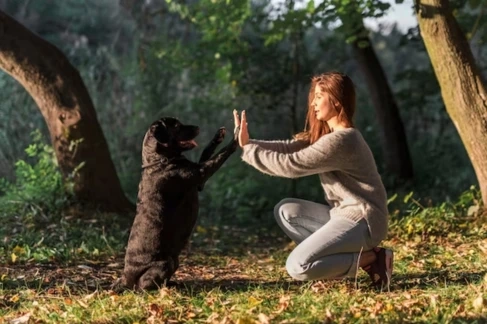Have you ever found yourself scratching your head, wondering why the generic dog training tricks just don't click for your fur babies?
Trust us, we've all been there.
You try to teach your dog the basics, and it's like they're on a different wavelength. Frustrating, right?
If you have ever thought of finding a dog trainer in Toronto, it is crucial to follow the right steps.
Let's make training as pawsome as your dog is with the steps to provide personalized training that suits his needs.
Assess Your Dog's Needs
Every dog is different, and what works for an individual dog in behavior training will vary.
First, look at their behavior. Are they super excited, or maybe a bit shy? Do they bark a lot or prefer quiet time? Understanding these things helps you know what training will work best for them.
Check their habits, too. Do they chew on things a lot? Dig in the backyard? Knowing these habits helps us create a plan to teach them better behaviors.
Finding the Right Private Dog Trainer
Finding the right private dog trainer is utterly important. Here are some tips when choosing a dog trainer for your dog:
Check if the trainer has certificates or special training. It's like making sure your teacher went to doggy school!More experience often means they know a lot about teaching dogs. Find out how long they've been helping doggies.Every trainer has a way of doing things. Make sure their teaching style matches what you want for your dog. Some like treats, some like play - it's all about what feels right for you and your pup.Don't be shy! Ask lots of questions to see if the trainer is the perfect fit. You can ask about their experience, how they handle naughty behavior, and what kind of tricks they can teach.Initial Consultation and Assessment
The trainer will watch how your dog behaves to understand them better. The training team will ask questions about your dog and what you want to teach them.
Setting Realistic Goals
It is super important to choose goals that are possible and not too hard.
If you break the big goals into smaller steps, it's like taking one step at a time instead of trying to jump over a big mountain.
Start with just one or two things you really want your dog to learn. It's like focusing on the most exciting parts of the adventure first.
Personalized Training Plan: Training Techniques and Methods
Just like people have different ways of learning, dogs do too! The training plan will also include what techniques work best with your dog.
Some dogs love treats, some enjoy playtime, and others like praise. The best private dog training centers will choose techniques that match your dog's style.
Consistency and Reinforcement
Consistency and reinforcement help make sure your dog learns and remembers their tricks really well!
Dogs learn through repetition and association. Being consistent in your commands and expectations helps your dog understand what you want from them.
Reinforcement, whether through treats, praise, or play, motivates dogs to repeat behaviors that lead to positive outcomes.
When a dog receives immediate rewards for the correct behavior, they are more likely to understand what is expected of them and learn faster.
Monitoring Progress
Monitoring progress in dog training is like checking how well your furry friend is doing in their learning adventure.
Pay attention to your dog's behavior at home. See if they're doing the tricks they learned during training.
Notice if they're getting better at listening to your commands and if they're feeling more comfortable with the training.
Wrap-Up
We've all been in that head-scratching moment, wondering why the usual doggy tricks work on your dog.
Just like people, they respond to treats, play, and praise in different ways. With the dog trainer in Toronto, training your dog is never too hard.
The consistency and reinforcement you provide become the glue that holds these learning moments together, making sure your dog understands, learns, and enjoys the process.


